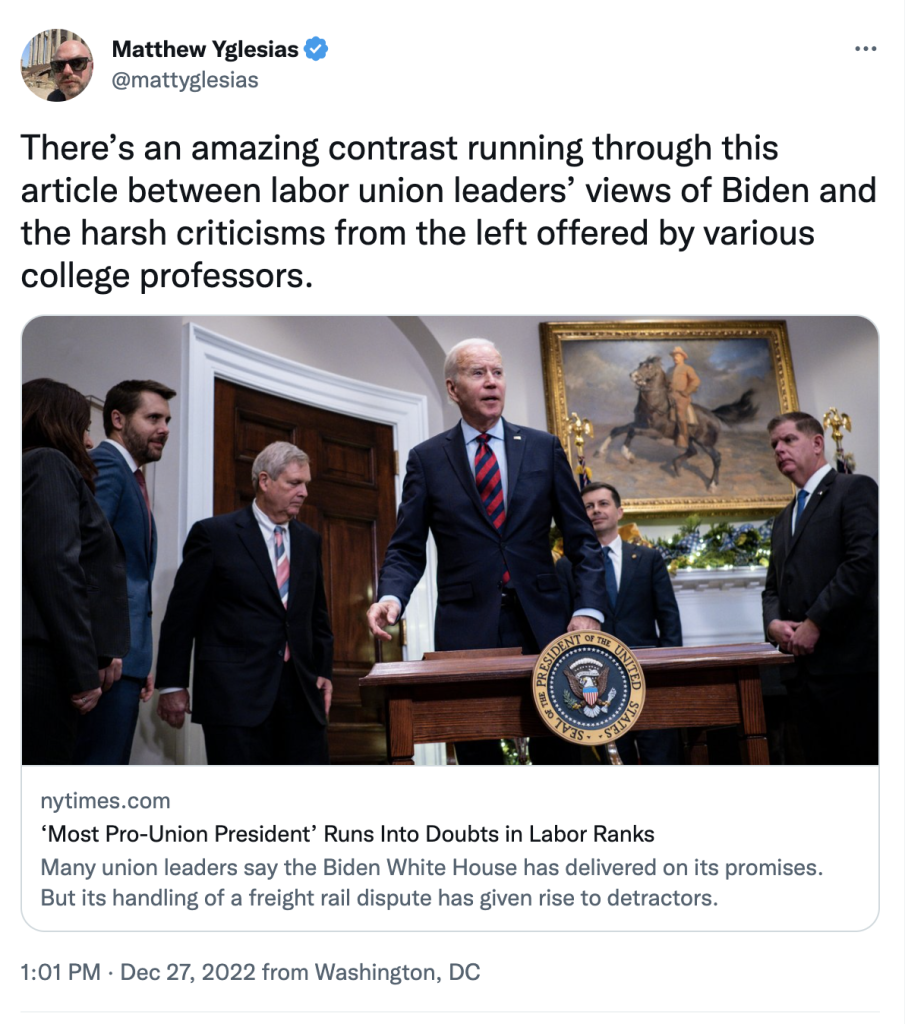A few days ago, Matt Yglesias tweeted the following comment about a New York Times piece on Joe Biden’s record on organized labor:

What’s interesting to me about the tweet is not the underlying question of whether Joe Biden is good or bad on labor, but rather how it relates to some of the problems in actually-existing deliberative democracy.
Chat GPT explains deliberative democracy as follows:
In a deliberative democracy, people are encouraged to participate in the decision-making process by sharing their views, listening to others, and engaging in thoughtful debate. The goal is to reach a decision that reflects the will of the people and takes into account the interests and perspectives of all stakeholders.
Newspaper articles like the one Yglesias is commenting on are meant to be the core material of deliberative democracy. They solicit various opinions from relevant stakeholders and interested parties in order to lay out a thoughtful debate that can inform decision-making by both leaders in power and the public as voters.
On the surface, this all looks great and surely somewhere Jürgen Habermas is smiling. But under the surface, something very unhealthy is usually going on in public deliberation and commentary that undermines the whole idea of deliberative democracy.
In an idealized version of deliberative democracy, people share their genuine opinions about various political questions, whether that’s their opinion on the merits of various policies, the records of various politicians, or which candidates are the best on certain issues. When people share their genuine opinions, this produces information that can aid in the decision-making process.
In practice, what often happens is that people don’t share their genuine opinions, but instead issue public statements with a certain strategic goal in mind. This is especially true of people whose opinion is highly valued because, for instance, they are very knowledgeable, widely trusted, or are the official representative of a large group of stakeholders.
Once someone who is important realizes that what they say can effect the decisions that others make, they cease to act as an honest participant in the deliberative process. Self-awareness of the mechanisms of deliberative democracy ends up corrupting the practice of deliberative democracy. What we wind up with is not actual deliberation, but rather a simulation of deliberation in which many, if not most, deliberators pretend to share their views when actually they are sharing whatever view they think will result in decisions that are most advantageous to them and their interests.
In my own life, as someone who has worked with left-wing politicians since I was a teenager, I’ve seen this play out most jarringly in the statements various important institutions make about candidates. The left-wing candidates I have worked for have always been, inarguably, the “best” on a dozen or so issues that various large stakeholder organizations promote. But getting these stakeholders to publicly acknowledge this — let alone endorse the candidate — is virtually impossible.
There are a variety of strategic reasons why these stakeholder organizations refuse to make public statements saying something that they know to be true about which candidate is the best on their particular issue. The most obvious one is that they think the candidate in question has very little chance of winning the primary or the general election.
They could just say “candidate X has the best record on issue A, but we would prefer that our members vote for candidate Y because we think that gives us the best electoral chances, which also gives us the best chance to make progress on issue A.” This would be perfect deliberative democracy in that it is a genuine opinion that produces information that decision-makers, i.e. voters, can use. But in many cases, sharing this genuine opinion would not be strategic because it would cause some people to vote for candidate X when you want them to vote for candidate Y and because it would alienate candidate Y and make them less likely to do things for you if they win the election.
So instead, the organizations simply lie and provide public statements that say candidate Y has the best record and best policies on issue A and that everyone should rally around them. These statements masquerade as deliberation and media outlets present them as deliberation. But they aren’t deliberation. They are dishonest messaging strategies.
Just as awareness of the potential strategic benefit of dishonest deliberating changes the behavior of deliberators, so too does it change the behavior of those who are supposed to be gleaning important information from deliberation. For good reason, onlookers become distrustful that deliberators are telling them what they really think and so actually-existing deliberative democracy ends up swallowing itself at both ends.
It’d be a bit grandiose to suggest that all of our problems with political and social trust originate from the perversion of deliberation, but surely it must contribute to those problems. When stakeholders opt for messaging strategies over honesty, the messaging strategies eventually stop working. Since deliberative democracy depends upon virtues that it does not cultivate, it is contradictory and unstable as a source of political legitimation and order.